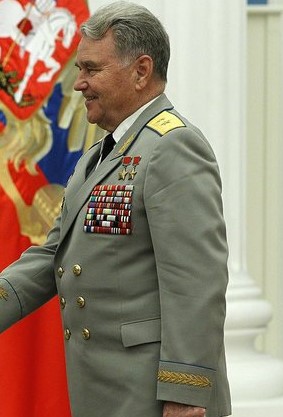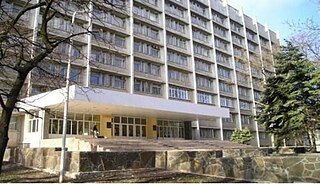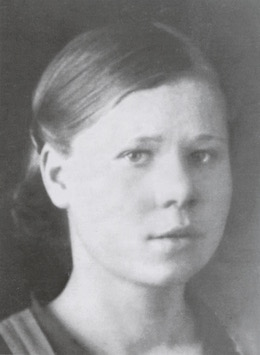
Alexander Mikhailovich Prokhorov was an Australian-born Russian physicist known for his pioneering research on lasers and masers in the former Soviet Union for which he shared the Nobel Prize in Physics in 1964 with Charles Hard Townes and Nikolay Basov.

Boris Borisovich Yegorov was a Soviet physician and cosmonaut who became the first medical doctor to travel to space. He was born in Moscow, Soviet Union and received his medical degree from the Moscow Medical Institute in 1961.

Vladimir Aleksandrovich Shatalov was a Soviet and Russian cosmonaut who flew three space missions of the Soyuz programme: Soyuz 4, Soyuz 8, and Soyuz 10. From 1987 to 1991, he headed the Yuri Gagarin Cosmonaut Training Center.

The Bauman Moscow State Technical University, sometimes colloquially referred as the Bauman School or Baumanka (Бауманка), is a public technical university (polytechnic) located in Moscow, Russia. Bauman University offers B.S., M.S & PhD degrees in various engineering fields and applied sciences. In 2023, US News & World Report ranked it #1,758 in the world.

Kalmykia, officially the Republic of Kalmykia, is a republic of Russia, located in the North Caucasus region of Southern Russia. The republic is part of the Southern Federal District, and borders Dagestan to the south and Stavropol Krai to the southwest; Volgograd Oblast to the northwest and north and Astrakhan Oblast to the north and east; Rostov Oblast to the west and the Caspian Sea to the east. Through the Caspian Depression, the Kuma river forms Kalmykia'a natural border with Dagestan. Kalmykia is the only region in Europe where Buddhism is the predominant religion.

Galina Vasilyevna Starovoitova was a Soviet dissident, Russian politician and ethnographer known for her work to protect ethnic minorities and promote democratic reforms in Russia. She was shot to death in her apartment building in 1998.

Zhukovsky Air Force Engineering Academy – is a higher military educational institution for training and retraining of engineers for the Russian Aerospace Forces.

The Order of Honour is a state order of the Russian Federation established by Presidential Decree No. 442 of March 2, 1994 to recognise high achievements in government, economic, scientific, sociocultural, public, sport and charitable activities. Its statute was amended by decree No. 19 of January 6, 1999 and more lately by decree No. 1099 of January 7, 2010 which defined its present status.

Rostov State Medical University is a Russian public university of higher professional education of The Ministry of Health and Social Medicine. Rostov State Medical University is also known as Rostov State Medical Institute, RostSMU, RostGMU, Rostov State Government Medical University.

The first deputy premier of the Soviet Union was the deputy head of government of the Union of Soviet Socialist Republics (USSR). Despite the title, the office was not always held by a single individual. The office bore three different titles throughout its existence: First Deputy Chairman of the Council of People's Commissars (1923–1946), First Deputy Chairman of the Council of Ministers (1946–1991), and First Deputy Prime Minister of the Soviet Union (1991). The term "first deputy premier" was used by outside commentators to describe the office of first deputy head of government.

The Medal "For Valiant Labour in the Great Patriotic War 1941–1945" was a World War II civilian labour award of the Soviet Union established on June 6, 1945 by decree of the Presidium of the Supreme Soviet of the USSR to recognise the valiant and selfless labour of Soviet citizens in the Soviet Union's victory over Nazi Germany in the Great Patriotic War. Its statute was later amended by decree of the Presidium of the Supreme Soviet of the USSR on July 18, 1980.

The passport system of the Union of Soviet Socialist Republics was an organisational framework of the single national civil registration system based upon identification documents, and managed in accordance with the laws by ministries and other governmental bodies authorised by the Constitution of the USSR in the sphere of internal affairs.

Marina Pavlovna Chechneva was a Soviet Polikarpov Po-2 pilot and squadron commander in the 46th Guards Night Bomber Regiment in World War II. She received the title of the Hero of the Soviet Union on 15 August 1946, after having completed 810 sorties during the war. Chechneva authored five books about her experiences during the war.
The 95th Fighter Aviation Division was a fighter aviation division of the Soviet Air Forces. The division was originally formed in 1949 as the 95th Mixed Aviation Division and became a fighter aviation division in 1954. It was disbanded in 1988 and was based in Shchuchyn from 1960.

The 125th Borisov Guards Bomber Aviation Regiment named after Marina Raskova was one of the three Soviet women's aviation regiments founded by Marina Raskova at the start of the Second World War. The unit was founded as the 587th Bomber Aviation Regiment in the 223rd Bomber Air Division, 2nd Bomber Aviation Corps of the 16th Air Army on 8 October 1941, and later honored with the guards designation, being renamed 125th Guards Bomber Aviation Regiment in September 1943 and reorganized into 4th Guards Bomber Aviation Division, 1st Bomber Aviation Corps, 3rd Air Army, in the 1st Baltic Front. Unlike the 46th Taman Guards Night Bomber Aviation Regiment, which used Polikarpov Po-2 utility aircraft, the unit was assigned modern Petlyakov Pe-2 aircraft, which caused some resentment among male units that had older aircraft. Throughout the course of the war, the unit flew 1,134 missions and dropped over 980 tons of bombs on the Axis.

Mariya Nikitichna Tsukanova was a medical orderly in the 355th Independent Guards Naval Infantry Battalion of the Pacific Fleet during World War II. After she was killed in action in August 1945 she was posthumously awarded the title Hero of the Soviet Union on 14 September 1945, becoming the only woman who fought in the Soviet–Japanese War to be awarded the title.

Gremyashchy was the lead ship of the Kanin-class destroyer of the Soviet Navy.

Admiral Yumashev was a Kresta II-class cruiser of the Soviet Navy.
Sergey Yakovlevich Zhuk was a Soviet hydraulic engineer, technician and state official. Hero of Socialist Labour (1952).
Ninel Grigoryevna Artsimovich also transliterated Arzimowitsch was a Soviet, Russian professor, doctor of Medicine and immunology. She has received the award of Honored Scientist of the RSFSR (1990). Her husband was Lev Artsimovich.

















